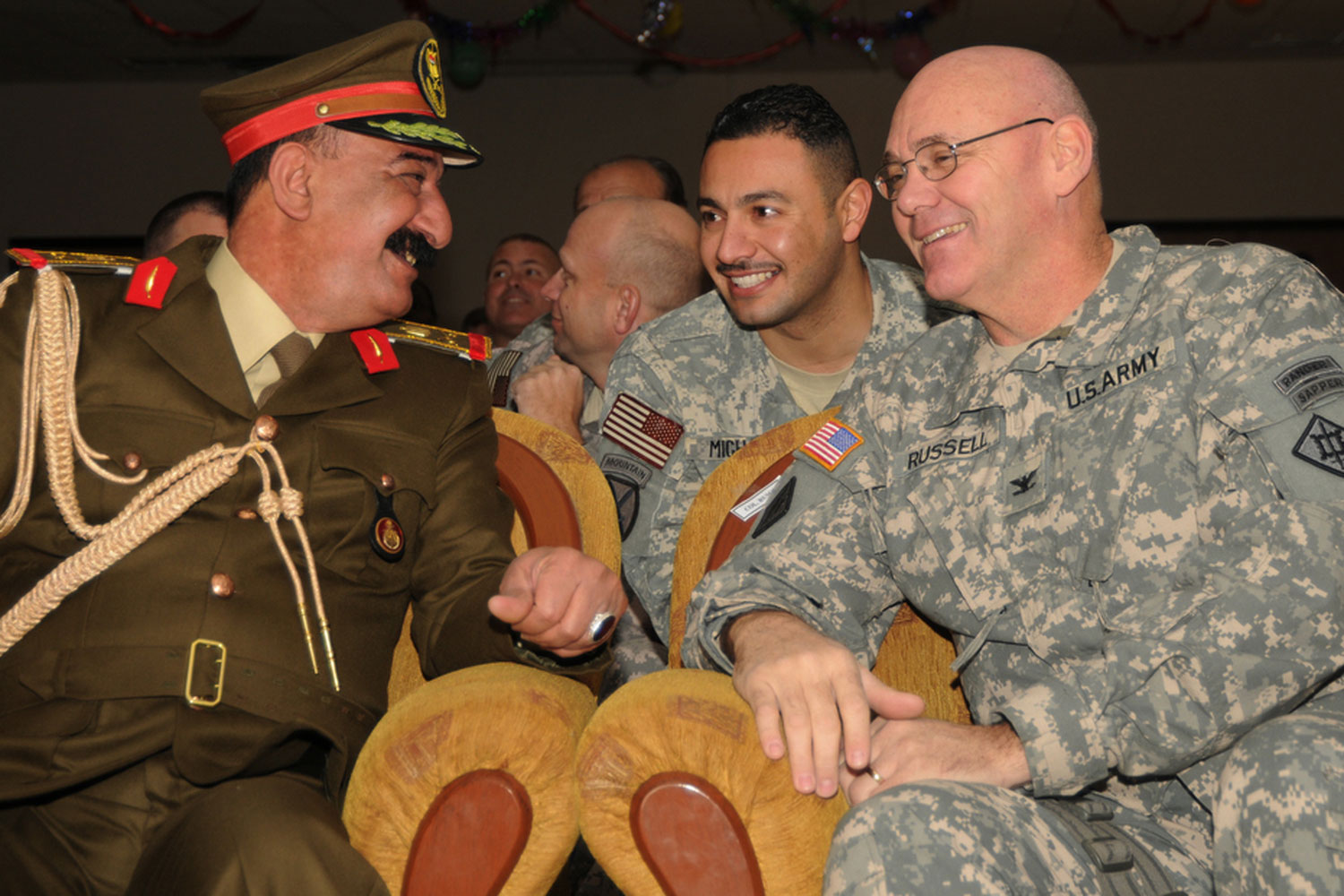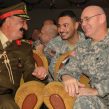Rising Arab-Kurdish Tensions over Kirkuk Will Complicate U.S. Withdrawal from Iraq
Publication: Terrorism Focus Volume: 6 Issue: 6
By:

Kurdish suspicions of Iraq’s central government have reignited after a January 22 decision by Baghdad to deploy the army’s 12th Division north towards the disputed oil-rich city of Kirkuk. This development, coupled with U.S. military plans to gradually disengage from Iraq, led Kurdistan Regional Government (KRG) Prime Minister Nechirvan Barzani to declare that U.S. President Barack Obama "has said more than once that they will withdraw in a responsible manner from Iraq…What we understand by a responsible withdrawal is that the United States resolves the problems outstanding in Iraq [before leaving]" (AFP, February 18). As the U.S. military relinquishes its security role to the Iraq Army, unresolved political issues are likely to exacerbate tensions between Iraq’s central government and the KRG, complicating American plans to withdraw and leave behind a stable and secured country.
Since 2003, four independently motivated forms of violence have defined Iraq’s security environment: the anti-Coalition insurgency, terrorism, sectarianism, and Shiite-on-Shiite violence. As of 2009, the threat posed by these four fronts has been dramatically alleviated due to the formation of the Sunni Awakening councils, Muqtada al-Sadr’s self-imposed militia ceasefire, and the U.S. adoption of a counterinsurgency strategy of clearing and holding territory. Iraqi Prime Minister Nuri al-Maliki has taken advantage of the improved security regime to consolidate and centralize his power. However, Maliki’s efforts have hastened a new form of instability many have characterized as inevitable, an instability that has emerged at the intersection of differing strategic interests held by Iraq’s two formal governmental institutions: the KRG and the national government in Baghdad.
There are five political issues that characterize the KRG-Baghdad rift:
• Kurdish foreign oil contracts
• Redistribution of oil revenues
• The role and size of the Kurdish peshmerga (militia) forces
• The growing debate over centralization and federalism
• Article 140 of the Iraqi constitution dealing with disputed territories
Last November, five committees consisting of members from the Patriotic Union of Kurdistan (PUK), Kurdistan Democratic Party (KDP), Islamic Supreme Council of Iraq (ISCI), Prime Minister Maliki’s Dawa Party, and the Iraqi Islamic Party (IIP) were formed to tackle most of these unresolved issues. Though progress seems somewhat fruitful when dealing with differences on the gas and oil laws, progress on Article 140 seems to be gaining no traction.
Article 140 is the most contentious issue behind the rising tensions. The article refers to a constitutional provision that sets forth a framework-normalization, census, and referendum -for dealing with territories disputed between the KRG and national government. Its implementation deadline of December 2007 was not met by Maliki, which has frustrated the Kurds. During the former Ba’athist regime, the government executed an "Arabization" campaign in Kurdish territories, expelling Kurdish families from their homes while providing financial incentives for Arab families to replace them. Today, Article 140 represents a symbolic justice to many Kurds who call for a reversal of the Arabization campaign. Though Article 140 represents 30 to 40 territories in dispute in Iraq, most emphasis is placed on the city of Kirkuk. With an ethnically mixed population of Kurds, Turkmen, Arabs, and Christians, the Kirkuk region holds 13 percent of Iraq’s known oil reserves (Middle East Times, February 18). Turkey, Iran, Syria, and many in Iraq believe that Kurdish acquisition of Kirkuk will sustain the economic base for a future declaration of statehood, and fear that it may provoke their oppressed Kurdish populations to secede as well.
During a November 20 press conference, Maliki claimed that the Iraqi constitution was put together too hastily and supported amending the governmental provision for federalism. Maliki openly called for greater centralization and for more powers to be allocated to Baghdad. The KRG immediately condemned this idea, warning that the Prime Minister planned to suspend the constitution. Maliki’s remarks led the Director of Kurdish Intelligence, Masrour Barzani, to make an early January visit to the U.S. Department of Defense. Barzani told his American hosts that the Kurds planned to fight any changes to the country’s constitution, pointing to the implementation of Article 140 as a critical solution to Iraq’s political problems (Kurdish Globe, January 9). Today, many Kurds fear that Maliki will use his upgraded political clout to call for a stronger central government, which Kurds fear would undermine Kurdish regional autonomy and any hopes of Article 140’s implementation.
Regarding the Iraq Army’s January military deployment around Kirkuk, peshmerga leader Mustafa Chawrash said, "The movement of the division is not normal and it is a planned agenda" (UPI, January 22). The army intends to create "a military belt" encircling the city, constraining contact with the Kurdistan provinces of Sulaymaniyah and Erbil and reducing the presence of Kurdish forces in Kirkuk (Kurdish Globe, January 22). Acording to Chawrash, the commander of the Iraqi 12th Division is General Abdul-Ameer Ridha, an ex-Ba’athist who led the same division against the Kurds during the Saddam Hussein regime. The U.S. military imprisoned him for four months before he returned to his post. The division consists of about 9,000 soldiers – 70 percent Arab, 20 percent Kurdish, and 10 percent Turkmen. The Kurdish press claims some Kurdish officers from the 12th Division, like the 9th Brigade and 2nd Battalion commanders, were transferred from Kirkuk to Tikrit city and replaced by Arab and Turkmen officers (Kurdish Globe, January 22).
Last December, then-President George W. Bush signed a Status of Forces Agreement (SOFA) with Iraq, creating a legal framework for a continued U.S. presence in Iraq. In effect since January 1, the SOFA requires U.S. forces to pull out of Iraqi cities by July 2009, with complete withdrawal from the country by the end of 2011. Many Kurds are uneasy about the prospects of the American safety-net disappearing. This fear is in large part inspired by Maliki’s use of the Iraq Army for political ends. Last summer, under the pretext of Operation Bashaer al-Kheir-a military campaign directed towards militias and terrorists in Diyala province-Maliki ordered the Iraqi Army to invade Khanaqin (See Terrorism Focus, September 18, 2008). An oil-rich city, Khanaqin is a disputed territory under Article 140. Many Kurds found this military decision provocative and dangerous since Kurdish peshmerga soldiers had occupied the area since 2005.
Dangerous rhetoric has also accompanied the expected American withdrawal and Maliki’s use of the military (Azzaman [Baghdad], December 2, 2008). Kurdistan PM Nechirvan Barzani recently suggested the possibility of an Arab-Kurdish civil war if Article 140 was not implemented (Middle East Times, February 18). Kamal Kirkuki, the KRG Deputy Speaker, went so far as to call al-Maliki "a danger to Iraq and to democracy; he is a second Saddam" (Al-Sharq al-Awsat, February 19). The growing Arab-Kurdish divide is also intensifying on the basis of a classical security dilemma: as a power vacuum develops in accordance with U.S. disengagement, both sides will unilaterally attempt to fill power gaps because neither side can afford to trust that the other’s future behavior will be benign. As a senior Kurdish official put it while speaking on condition of anonymity, "Kurds have made a judgment that he [Maliki] cannot be trusted and that’s the worst part of this-it’s not about the technicalities of oil law and this and that-this issue of trust was shattered" (CSM, December 11, 2008).
While the Obama administration seeks to disengage from Iraq, the transition of power is likely to increase tensions between Baghdad and the KRG as factions compete to out-leverage one another. Maliki’s consolidation of power and provincial electoral gains have lessened his dependence on the PUK, KDP, and ISCI-the three factions that once saved his government from collapsing in August 2007. This may provoke a realignment of power amongst Iraq’s domestic players. The surprising performance of former Prime Minister Ayad Allawi in the January provincial elections will provide an adequate challenge to Maliki in national elections later this year. This circumstance may lead the PUK, KDP, and ISCI to form a common alliance to save Iraqi federalism. Conversely, strong nationalists-like Shiite firebrand cleric Muqtada al-Sadr and the Sunni Arab tribesmen-may adhere to an alliance of convenience with Maliki.





